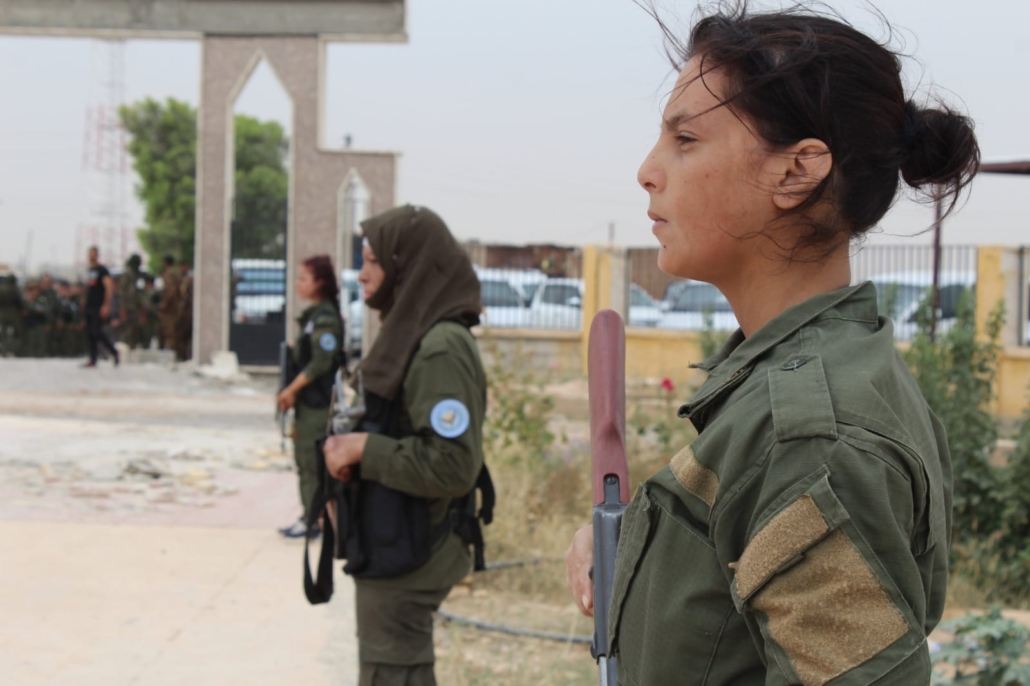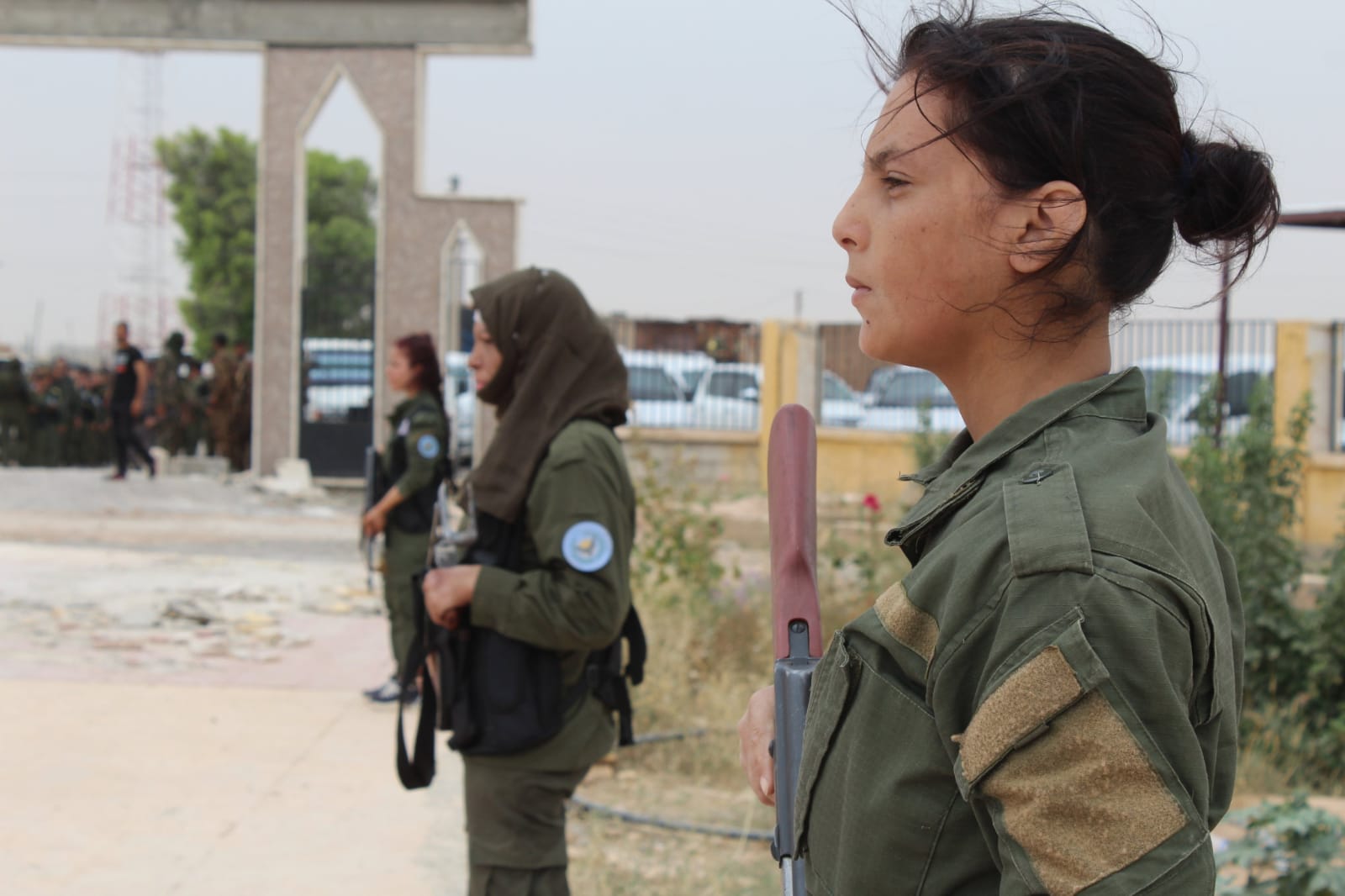Explainer: Arab Women in Security and Defense of North and East Syria

With the advances of the SDF through the Arab-majority regions and the establishment of the new political system, women started to join the security and defence forces. In the system of the AANES, women participate on all levels in the security and defence forces, within women’s only units.
This means the YPJ, or Women’s Defence Units, in the military field (along with other women only-units, such as those in Christian militias or in Free Syrian Army (FSA) units now part of the Syrian Democratic Forces (SDF), like Liwar Thuwar al-Raqqa); the Asayisha Jin, or women’s internal security force; and the HPC-Jin, a women’s neighborhood defence and community policing force (for more information read our explainer on military and self-defence forces in NES).
Sara Hilal, the commander of the Asayisha Jin in the Deir ez-Zor region, explains how signing up to join the Asayish constituted a transformation of her place in society:
“Because we wanted to claim our freedom, as women from Deir ez-Zor we took up posts in the civilian and military institutions in the region. With time, we no longer accepted to live as slaves, or under repression, and we can now see that women have an important role to play and must participate [in society] on the highest level.”
Sara Hilal, commander of the Asayisha Jin in Deir ez-Zor region
In Arab regions across NES, many women find joining the YPJ or another women’s self-defense force the easiest route available to them to flee domestic abuse or marginalization in the home and live in a secure, all-female environment. The YPJ has training academies and bases across the Arab regions, and though the all-female force remains majority-Kurdish it now boasts a growing contingent of Arab members.
Girls aged sixteen to eighteen (or even younger) fleeing violent home situations may also be housed in these academies and receive an education, but will not be allowed to receive military training or participate in combat until they turn eighteen. In other cases, young women may be returned home following mediation by the Women’s Houses, Reconciliation Committees or wider women’s movement, or may be rehoused elsewhere in civil society by these structures.
Arab members of YPJ have participated in military operations against ISIS and Turkey across NES. While fully participating in combat operations, YPJ members also took on special responsibilities, like dealing with the tens of thousands of Arab women and children streaming out of ISIS’ final holdout in Deir ez-Zor, providing first aid, humanitarian care and patting down women for the explosives they may carry with them.
Today, women in the Deir ez-Zor branch of Asayisha Jin operate checkpoints on the roads and conduct security checks. “In particular, as women, we are able to conduct checks and ensure security where there are women involved,” Ms. Hilal explains.
The women also participate in security operations against ISIS sleeper cells. When it comes to raiding homes with female residents, the Asayisha Jin enter the premises first, as it is culturally accepted frowned upon that men enter a house where there are women present. “To prevent any difficulties, we women play the leading role in this area,” Ms. Hilal says.
However, Ms. Hilal also points out several difficulties women of her profession face in the region. Social norms still constitute a barrier for women to join the security and defense forces, as they break with traditional women’s roles. In addition, while carrying out their tasks, they struggle to be taken seriously. Ms. Hilal says: “We have some problems here as a result of our tribal society. This society does not accept women. Women must remain at home and prepare food, that’s it. They must work to take care of their husband and their children, and look after the sheep. Women’s burden is heavy. They also had to work in the garden, and on the land. They were never accepted in any other capacity. Our tribes do not give any rights to women. They must remain at home, while the men go out.
“We have some problems here as a result of our tribal society. But now, many things have changed. When women started working on the checkpoints on the roads, no one took us seriously or gave us any importance. But through our willpower, we were able to affect major changes.”
What is more, women working for the security and defense forces are a prime target for attacks by ISIS sleeper cells. Two members of the Asayisha Jin were assassinated in 2020. One was killed in a car bomb while another, one of the first Arab women to join the Deir ez-Zor Asayish back in 2018 and a leading female figure in the region’s security forces, was assassinated by several gunmen.
It is not only women working in the security and defense forces who are threatened, with Women’s Houses and other civilian institutions also targeted in regular, sometimes deadly, attacks.
“The security situation in the region of Busayrah is still very unstable, and it is a very good thing that we have many women working there in the Women’s Council. The Women’s Council in Busayrah has recently been attacked for the second time. The first time, the security guard was killed by someone who wanted to steal money from the Council. The second attack occurred at 4AM, when someone placed a mine before the door of the Women’s Council. This isn’t only about violence and death. These attacks also spread fear in order to weaken the determination and personal character of the women working in the Council.”
Hiyam Mehmood al-Ahmed, Deir ez-Zor Women’s Council employee
The combination of a still-patriarchal society which is reluctant to allow the ideas of gender equality to shake the established social order on the one hand, with a very active ISIS insurgency that violently opposes women’s institutions on the other, constitutes a formidable barrier for women to engage with autonomous women forces and institutions. Women who are actively engaged with these bodies are acutely aware of their role as pioneers of major and ongoing societal change – with all the challenges that this entails.
Learn more on women’s organizations in the Arab regions of NES in our dossier Beyond Rojava.


Trackbacks & Pingbacks
[…] de ISIS, las mujeres de las demás comunidades de Siria se unieron. Hoy en día, las mujeres árabes, sirio-asirias, yezidíes y armenias no solo participan activamente en las instituciones femeninas […]
[…] the outbreak of the Syrian Civil Battle, the Kurdish and non-Kurdish women of Northeast Syria have been placing into follow Öcalan’s imaginative and prescient of a […]
Comments are closed.